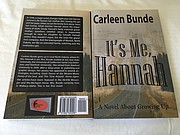Book review: 'It's Me, Hannah' by Carleen Bunde
Hannah is an eight-year-old girl as the story opens with the sudden death of her mother in a gruesome auto accident in the town of Munich, North Dakota. Her only nearby relatives are her father, Johan, who is a Swedish immigrant farmer, and her maternal grandma, Lieula. But Munich is a small town, where most people know each other, and Hannah has many friends, especially Annabelle Murger, her same age; their mothers were best friends.
She and her father are both devastated by her mother’s death, but Johan takes charge of his home, his farm, and his daughter’s needs. She gets into many adolescent scrapes, tries to hide them, but ultimately can depend on both her father and her grandma for emotional support and help. She does her part well in the farm chores along with her father, and in her studies in the little one-room school; she even copes with a mentally disturbed school teacher whom the school board finally dismisses. She becomes an able cattle herder with the help of her horse Sally, and her dog Maggie.
Puberty and high school in town, both beginning in the same year, are difficult times, shared with her friend Annabelle. Hanna and an older boy are attracted to each other, causing arguments with her father. She gets a part-time job as a car-hop at Nick’s Drive-In and loves it, gets along well with the other workers. Gets in trouble driving Papa’s pickup without his knowledge, and gets stuck in a ditch in the middle of the night.
She is stressed out when her Papa, after several years as a widower, starts dating Lucy Swan, a newcomer to town. Some weeks later, after work, he tells Hanna, “Get in the car and go pick up your grandma, I have something to say to you both.” When they return, Papa’s best friend, Jacob, is sitting with him at the kitchen table.
Grandma arrives, worried about what trouble her son-in-law may be in. Says, “Johan, do you want us to sit in the parlor?”
“No, Lieula, vat I got to say, I can say right here in the kitchen.” He took his pipe out of his mouth, leaned back in his chair … “Now jou know as vell as I do dat I’ve been courtin’ Lucy Swan for some time. She’s a mighty fine voman.”
He turned to me. “Hannah Marie, you’re almost grown-up now.”
I nodded.
All of a sudden, I’m grown-up?
“Vell, folks, vat I’ve got to tell you is: Lucy and I are getting married.”
The news almost took my breath away.
I can’t imagine Papa married to anyone but Mama, and I really can’t imagine Papa and Lucy kissing or anything like that.
“Papa, did you say that you and Lucy are getting married?”
“I’ve asked her and she said yes.”
Grandma’s mouth dropped open and her face went white. “Well, I never.”
Jacob scratched his head hard and fast. “The hell you say, Yohan.”
In a faint voice, Grandma uttered, “What’s this world coming to? She’s half your age. Johan, you could be her father.”
“Age is yust a number.”
“Don’t you care what people will say?”
Papa rubbed his chin and looked over his bifocals at Grandma. “Jah, I care, but I care more about Lucy. I yust told you, I’m marrying her and dat’s dat.”
Jacob slapped the table with his big hand. “Goot for you, Yohan.”
Grandma pushed back her chair, stood up and strode right out the door.
“Come on, Hannah,” she wailed.
In a hurry to leave the table, I nearly turned over my chair. Papa heaved himself from his seat and walked with me to the back door with his arm across my shoulders.
This story is easy reading (although an author’s written version of a foreign language dialect can be a stumbling block for the reader.) It will be of interest to those parents and teen-agers hoping to someday understand each other. Author Bunde relates family conflicts in brief, vivid scenes. The constant theme is that children are much more likely to prosper if there is an adult in their life who loves them unconditionally.
The last 10 pages of the book summarize the rest of Hanna’s life, and end in a surprising sign-off.



